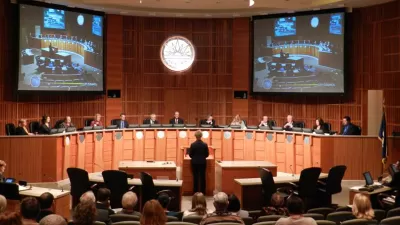Howard Blackson explains the five elements ("five Cs") necessary for planning resilient and lively neighborhoods - complete, compact, connected, complex, and convivial.
Rather than focus planning at the level of "community", which is inherently difficult to define, Blackson argues that the neighborhood unit, "is a better tool to define, plan, and express policies and regulations
necessary to preserve, enhance and, yes, build great places."
It's at the level of the neighborhood unit that Blackson's 5 Cs apply. To be complete, great neighborhoods must have a mix of uses and a defined center, middle, and edge. To be connected, they must go beyond accessibility to include opportunities for social connection. "[T]he coffee shops, pubs, ice creme shops, churches, clubhouses, parks, front yards, street fairs, block parties, living rooms, back yards, stoops, dog parks, restaurants and plazas," that connect people, also lead to the 5th C - conviviality.
FULL STORY: The five Cs of neighborhood planning

Planetizen Federal Action Tracker
A weekly monitor of how Trump’s orders and actions are impacting planners and planning in America.

San Francisco's School District Spent $105M To Build Affordable Housing for Teachers — And That's Just the Beginning
SFUSD joins a growing list of school districts using their land holdings to address housing affordability challenges faced by their own employees.

The Tiny, Adorable $7,000 Car Turning Japan Onto EVs
The single seat Mibot charges from a regular plug as quickly as an iPad, and is about half the price of an average EV.

As Trump Phases Out FEMA, Is It Time to Flee the Floodplains?
With less federal funding available for disaster relief efforts, the need to relocate at-risk communities is more urgent than ever.

With Protected Lanes, 460% More People Commute by Bike
For those needing more ammo, more data proving what we already knew is here.

In More Metros Than You’d Think, Suburbs are Now More Expensive Than the City
If you're moving to the burbs to save on square footage, data shows you should think again.
Urban Design for Planners 1: Software Tools
This six-course series explores essential urban design concepts using open source software and equips planners with the tools they need to participate fully in the urban design process.
Planning for Universal Design
Learn the tools for implementing Universal Design in planning regulations.
Smith Gee Studio
City of Charlotte
City of Camden Redevelopment Agency
City of Astoria
Transportation Research & Education Center (TREC) at Portland State University
US High Speed Rail Association
City of Camden Redevelopment Agency
Municipality of Princeton (NJ)





























